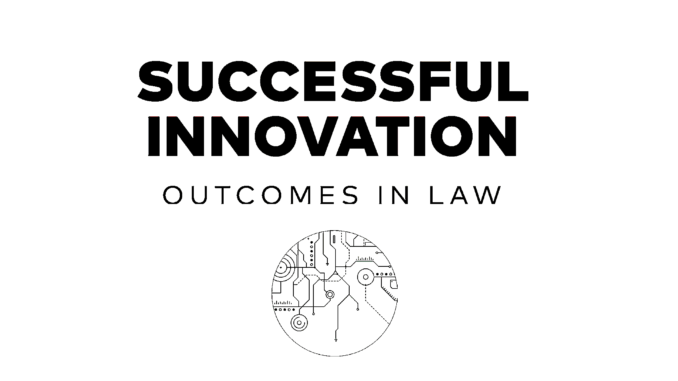
Looks like Artificial Lawyer is doing another book review. This time it’s a work by Dennis Kennedy, a US-based lawyer who was inhouse at Mastercard, built his own law firm, and is now running an innovation advisory business, among other things. His new book is called ‘Successful Innovation – Outcomes in Law’. Here’s an overview and some thoughts.
—
The 212-page tome is a smorgasbord of insights about how people at law firms, corporates, or within tech vendors, might want to think about the I-word.
Taking one overall theme to focus the review on is perhaps not the best way to do this, as the book covers a lot of ground across 50 or so pithy chapters, all of which connect in one way or another with the I-word. Each chapter also ends with a ‘pro tip’, which summarises the key takeaways – and that helps.
So, instead this reviewer will pick out some of the best aphorisms and work from there.
Where shall we start? How about Chapter One? ‘While it is important to get alignment on your approach to innovation, it’s OK to quickly get to close enough on the definition,’ Kennedy writes.
I.e. have a plan about what it is you are trying to do – and then do it – leave the definitions to the linguists and metaphysicians. Sound advice. No point wondering about how many angels can dance on the head of a pin – when there are practical challenges to deal with.
And then Chapter Four has a great pro tip:
‘Look outside the legal silo and learn the standard types of innovation and business models. Think more in terms of recombining ideas from other sources than creating completely new ideas out of thin air.’
I’d second that. Getting the law to see it’s just one of many legs on the socio-economic centipede is vital if we’re really going to change things. And, although law does have some very distinct characteristics, it’s not the first sector to ever handle digitisation and a drive for greater efficiency, see: fintech.
As you read through the book there’s a lot of insight about the many paths that innovation can go down, and then we move into the really meaty stuff. Such as: focus on the customer.
‘You have to get the customer into the conversation at the beginning,’ is his key point here.
Again, a good idea. Although, on a practical level it’s not always easy to go to the market for input when your thoughts are still taking shape. Perhaps the main challenge here is to get a clear idea about what it is you are trying to achieve, get market feedback and then be totally open to iteration and even redesigning from scratch.
One other point from AL is that the market doesn’t always know what it wants. Or even when it does, it can’t always articulate this in the same terms you may be working with.
Let’s face it, when ‘a good idea’ meets reality it’s always a messy process. The trick is being able to hold onto the goal with Jobsian determination, while still keeping open to customer feedback. It’s a hard balancing act.
We then move eventually to the section on practical examples of what a good product looks like that meets the market’s needs. Here is one of them:
‘Simple Dashboards. Far too often, basic information needed by a general counsel or in-house counsel is simply not readily at hand in an easy-to-find and easy- to-consume way. Talk to any general counsel and you are likely to hear a story about them being asked by a CEO or CFO simple business questions like year-to-date legal spend, spend compared to budget, total legal exposure, law firms with highest spend, and other standard metrics (let alone key performance indicators), and not having any answer other than, at best, that they needed to have some reports run to get this basic information,’ Kennedy writes.
Great observations there and there are others like that to peruse.
Toward the end of the book we get to ’57 Tips’ for any innovators out there. Here’s a couple of them I especially liked:
‘What happens if you look at a project and invert the maxim of ‘people, process, then technology’ and frame your effort as ‘technology, process, then people’? Does it provide a new insight or framework?’
And,
‘Experiments give us data we can analyze and use for improvement. Stress test your hypotheses. If you don’t, your customers will.’
And finally,
‘Keep learning. Every day.’
Amen to that one. Never stop learning – indeed.
Conclusion –
Is this ‘a good book’? Yes. If you are in this field, or thinking of engaging with the I-word seriously, then this is a great overview of what matters and how to get going.
It’s hard to critique in terms of any particular argument or position, as it covers so many points. This is not a philosophical treatise on how to create a legal services revolution. It’s practical and hands-on. It’s also encyclopaedic and full of wise observations in feel and tone, rather than didactic and pushing home one particular view.
Yet, for the super-experienced Jedi masters of the mystical force known as ‘I’ – this will also act as a useful bedside book, acting perhaps as a touchstone for their own thoughts on the subject.
Overall then, I’d recommend this book. It may not change your world, but if you’re on the I-path then it may well become your trusty companion and a source of practical encouragement.
—
Successful Innovation – Outcomes in Law – is available on Amazon.
—
Review by Richard Tromans, Founder, Artificial Lawyer
1 Trackback / Pingback
Comments are closed.